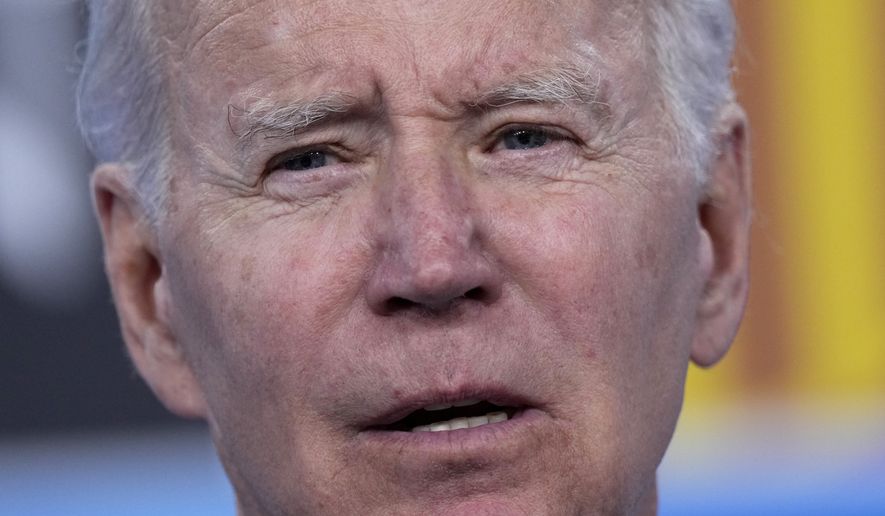OPINION:
Joe Biden fancies himself a transformational president like FDR but behaves like a throwback from big-city political machines. He is seeking to buy the midterm elections by pardoning those jailed for marijuana possession, forgiving up to $1 trillion in student loan debt and running down the Strategic Petroleum Reserve.
Dumping SPR oil on domestic markets pushed gasoline prices from $5.11 in June to $3.77 in September, but that plan was foiled somewhat by European sanctions on Russian oil and Saudi Crown Prince Mohammed bin Salman’s consorting with Russian President Vladimir Putin to curtail OPEC oil production.
Mr. Biden has depleted 36% of the SPR. If enough oil is to be kept for a security emergency like a war in the Gulf that choked global supplies, he must stop pumping petroleum from salt domes. Gas prices will then skyrocket even as the economy slides into a recession designed by the Federal Reserve to curb inflation.
Mr. Biden may cynically blame greedy oil monopolists, Mr. Putin’s war and the Saudis, but the responsibility rests squarely with him. Despite spending 26 years in the Senate and eight years as vice president, he has crafted through regulation and the Inflation Reduction Act policies that show little understanding of how U.S. energy markets work.
The United States may be the world’s largest producer and has the potential to supply all its own needs, but petroleum products are commodities whose prices are largely determined by international market conditions.
Treasury Secretary Janet Yellen’s plan to cap the price of Russian oil, which still flows to China, India and other markets in Asia, won’t work well. As the European Union denies international shipping companies access to insurance, Russia can curtail production and force non-Western customers to rely more on the real oil monopolist — Saudi Arabia through its dominance of OPEC.
Mr. Biden ambitiously seeks to generate 80% of U.S. electricity from wind solar and other renewables, reduce economy-wide carbon emissions by 50%, and boost EV sales to half of all cars sold by 2030. And as a byproduct of the new investment, resurrect American manufacturing through domestic content requirements, enable monopoly unions and promote through discriminatory set-asides the social engineering agenda of Black Lives Matter, Lean In and the rest of the culture industry that profits from the diversity and inclusion shakedown bedeviling American businesses, professional societies and schools.
Perhaps intoxicated with the success of Obamacare in socializing and sometimes monopolizing through government regulation the U.S. health care industry, the West Wing believes it can through edict and subsidies wholly transform the American energy and automobile industries. But those markets are terribly different.
Before Obamacare, the federal government directly and through state agencies was already bankrolling large shares of U.S. health care purchases through Medicare, Medicaid and military and veterans’ benefits.
Whereas the U.S. electricity, petroleum and motor vehicle markets are dominated by private purchases and largely regulated by politically independent federal agencies like the Federal Energy Regulatory Commission and state and municipal governments.
Permits to build windmills and solar farms are often controlled locally and power grids are largely run and jointly regulated by states, consortiums of states and federal agencies.
The building blocks of green energy, polysilicon and lithium, are largely produced abroad and too often in China. Permitting new manufacturing and mining in the United States is controlled by the states and NIMBY activists who abuse the courts to impose lengthy delays.
Reliance on green power requires massive new power transmission lines to bring electricity from where the sun shines and the wind blows to the cities that need it. Environmental reviews and other litigation can take up to a decade, and sometimes local building permits are never released.
Green energy requires nuclear or fossil fuel backup, but regulatory preferences for solar and wind often make those too expensive to operate. Hence, blackout risks are exacerbated in Texas, California and elsewhere, and that uncertainty will spread throughout the nation as the transition to renewable energy continues.
Mr. Biden is pushing Americans into EVs and away from fossil fuels generally by limiting pipeline development and leasing for oil and gas drilling and discouraging financing for private projects. Taking the cue, five U.S. refineries have recently shut down.
His hasty and botched withdrawal from Afghanistan and calling out MBS for the murder of Jamal Khashoggi encouraged Mr. Putin to believe that Western opposition to an invasion of Ukraine would prove fleeting. And for MBS to consort with Mr. Putin to cut OPEC production rather than lend a sympathetic ear to the president’s requests to keep the oil flowing.
All of this will make the job of the Federal Reserve in curbing inflation more difficult, but the price of gas can only go down if the president dangerously depletes the SPR or the Fed imposes tortuously slow growth or a permanent recession.
• Peter Morici is an economist and emeritus business professor at the University of Maryland, and a national columnist.




Please read our comment policy before commenting.